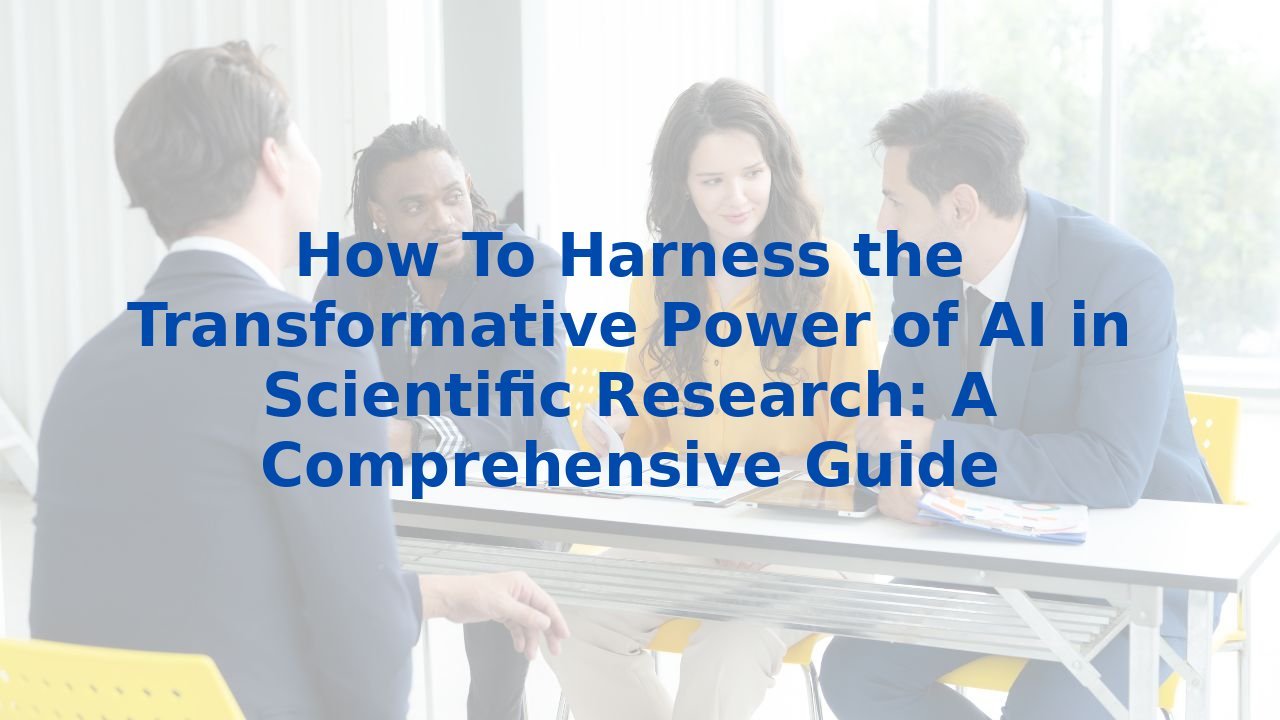How To Harness the Transformative Power of AI in Scientific Research: A Comprehensive Guide
How To Harness the Transformative Power of AI in Scientific Research: A Comprehensive Guide
Introduction
In an age increasingly defined by rapid technological advancement, the integration of artificial intelligence (AI) in scientific research stands as a beacon of opportunity. AI is not just a tool but a transformative force that is reshaping how we explore, understand, and innovate within various fields of study. This guide aims to illuminate how businesses can harness the power of AI to enhance their research processes, ultimately enabling organizations to achieve unparalleled efficiency and effectiveness.
Enhancing Scientific Research with AI
1. Hypothesis Generation and Experiment Design
The journey of scientific discovery often begins with formulating hypotheses. AI tools are adept at sifting through vast datasets to detect trends and correlations that the human eye may miss. By generating hypotheses based on comprehensive analysis, AI allows researchers to venture into new territories of inquiry and design their experiments with precision. This informed approach paves the way for more significant revelations.
2. Data Analysis and Interpretation
Data underpins scientific research, and large datasets can prove daunting to analyze manually. Here, AI shines by processing information swiftly and accurately. It identifies hidden regularities and anomalies, offering insights that lead to more robust conclusions. This process not only enhances the reliability of results but also streamlines workflows, freeing researchers from the bottlenecks of data crunching.
3. Experimentation and Simulation
Imagine conducting experiments faster and at a fraction of the cost. AI technology empowers scientists to simulate various scenarios, allowing them to explore multiple design options without the immediate need for physical trials. This capability enhances creativity and reduces resource expenditure, leading to innovative solutions to age-old problems.
4. Literature Review and Hypothesis Formulation
The research landscape is vast, and staying updated is critical. AI-driven tools can scan extensive libraries of academic articles, summarizing key insights efficiently. This acceleration in information processing helps researchers craft stronger hypotheses and strategically narrow their focus as they navigate the endless sea of existing literature.
Benefits of AI in Scientific Research
1. Efficiency and Speed
AI significantly streamlines the research process, reducing the time spent on repetitive tasks and data analysis. By automating these processes, researchers can redirect their efforts to higher-order thinking, creativity, and strategy—core elements that truly drive scientific advancement.
2. Accuracy and Reliability
One of the pivotal benefits of AI is its capacity for accurate data processing and analysis. This fosters increased reliability in scientific findings, aligning with the critical need for replicability in research. When results can be corroborated through AI-enhanced methods, trust in scientific inquiry grows.
3. Ethical Considerations
The rise of AI also brings ethical considerations to the forefront. It is vital to ensure the equitable distribution of AI technology and to address biases inherent in AI systems. This requires a commitment to ethical guidelines and practices that prioritize fairness in AI applications across various disciplines.
The Importance of AI Literacy
1. Training Employees for AI
The promise of AI is contingent upon the skills and readiness of the workforce to engage with this technology. Organizations that invest in AI literacy training equip their teams not only to use AI tools effectively but to embed AI into their everyday workflows. This cultural shift toward embracing AI significantly enhances productivity and innovation.
2. Addressing Biases and Inequities
Pursuing ethical AI use goes hand-in-hand with addressing systemic biases. Training programs should not merely focus on technical skills but also promote diversity and inclusion within AI development. By fostering a workforce that reflects varied perspectives, organizations can improve AI applications and outcomes within scientific research.
Conclusion
The integration of AI into scientific research heralds a transformative era for organizations committed to pushing the boundaries of discovery and innovation. From optimizing hypothesis generation to enhancing data analysis and ensuring ethical practices, AI offers robust solutions that redefine the research landscape. By prioritizing AI literacy and embracing ethical considerations, we set the stage for a future where scientific inquiry is propelled by efficiency, creativity, and fairness. Embracing this journey is not just an option; it is a necessity for organizations seeking to thrive in an increasingly complex world.
If you're interested in equipping your entire workforce with AI skills, consider exploring comprehensive training solutions tailored for organizations.



